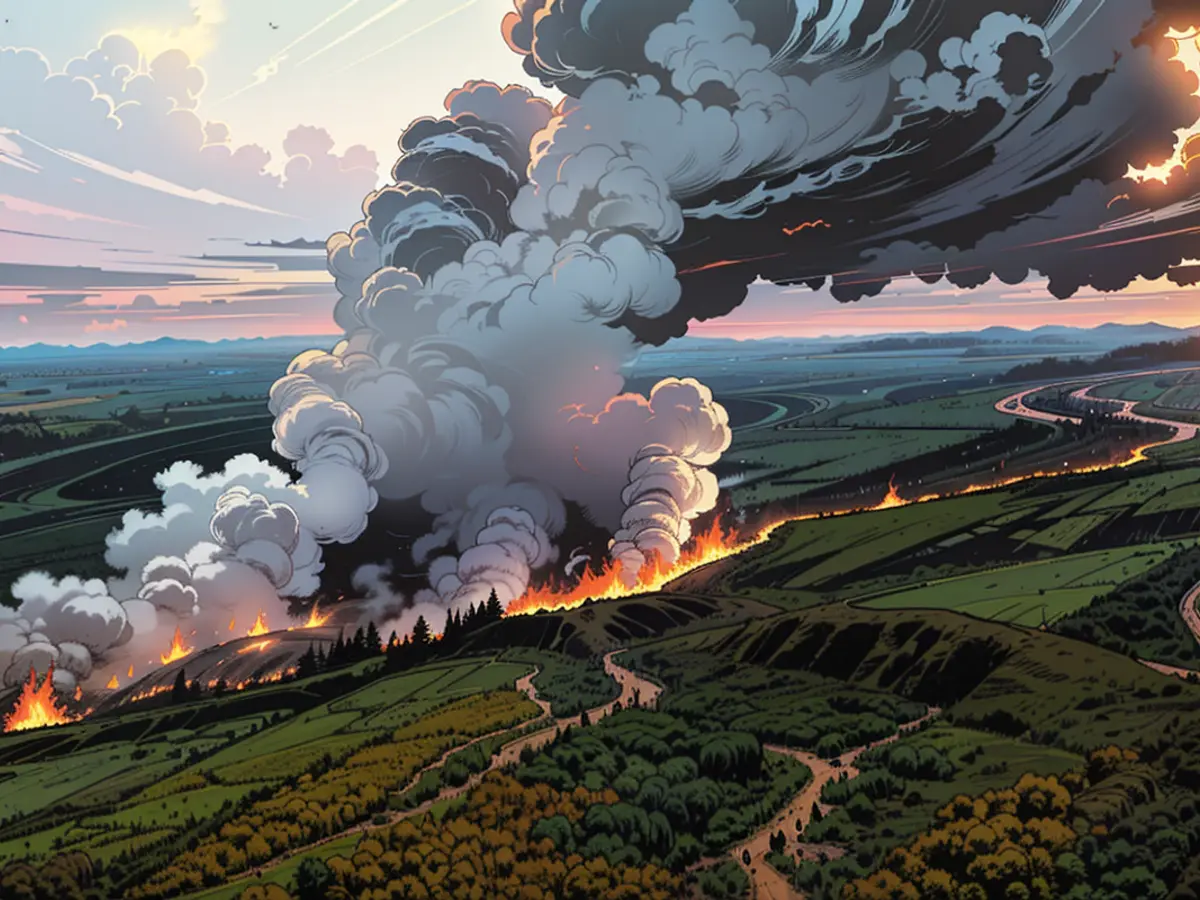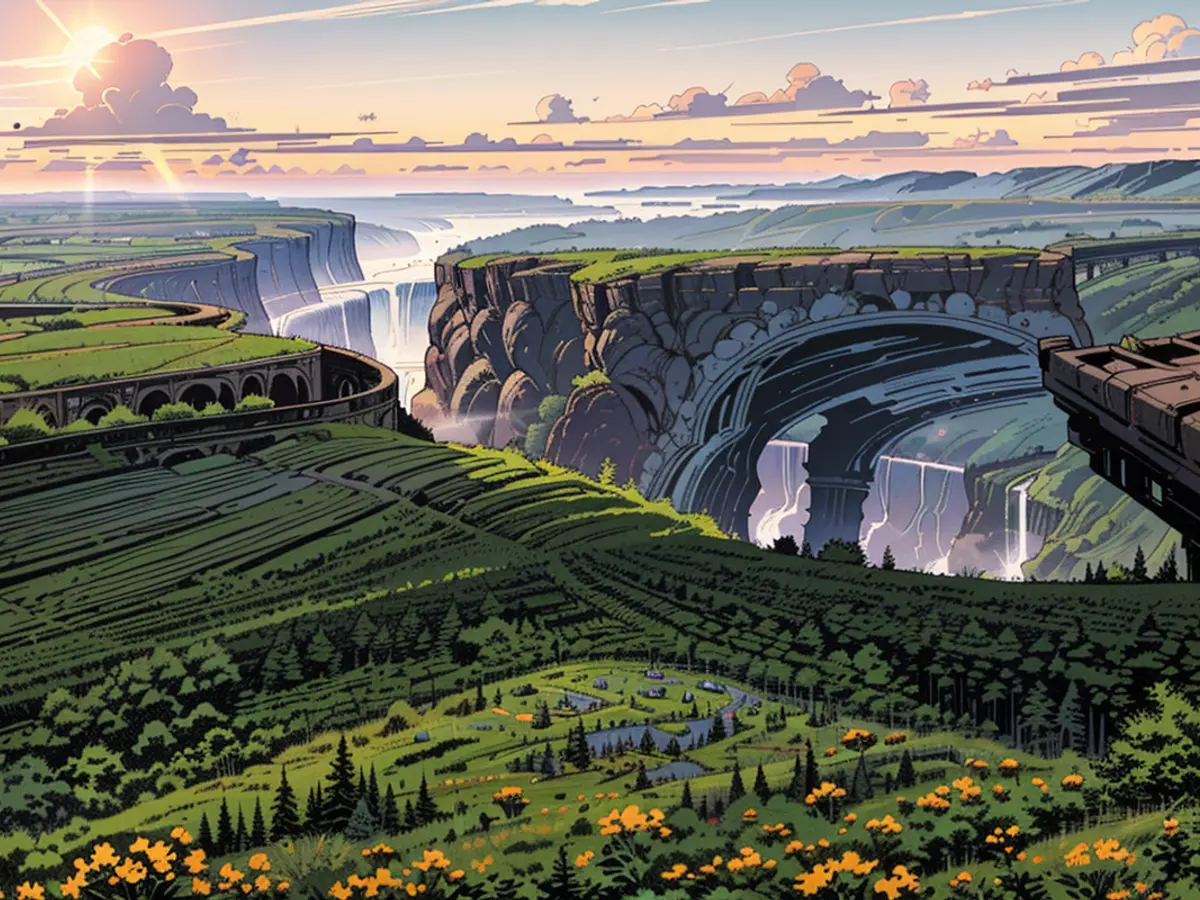Firefighting personnel engage in a substantial conflagration overpowering a New Zealand wetland habitat housing endangered species.
The blaze engulfing the Waikato wetland on New Zealand's North Island spans an area of approximately 15 kilometers (around 10 miles) and has torched over 2,471 acres (1,000 hectares) since it ignited on Monday, as authorities reported. They predicted it might take several days to get the situation under control.
Experts have voiced concerns about the possible impact on one of New Zealand's largest carbon sinks, noticing that protected environments like oceans and forests eliminate more carbon dioxide than they put out, playing a crucial role in combating global warming and climate crisis repercussions.
About 50 firefighters, along with helicopters and airplanes, have been deployed to the site situated south of Auckland, the country's major city, as mentioned by Fire and Emergency New Zealand (FENZ). The residents and businesses in the area face no immediate danger, authorities assured.
“This is a substantial fire, and it might take a few days to properly contain it,” Incident Controller Mark Tinworth said in a press release issued on Wednesday.
The combustible peat, a deposit of decaying plant material, found in bogs and wetlands, adds to the fire's complexity, as it can burn beneath the surface and is difficult to locate and extinguish, Tinworth added.
The fire jeopardizes the wetland ecosystem, an essential habitat that is scarce in other regions, experts recognize. The Waikato wetland is a mosaic of swamps, bogs, marshes, and open waters surrounding two rivers, categorized as one of New Zealand's three key wetlands restoration programs.
Part of the Ramsar List, an international agreement designed to safeguard important wetlands, the wetland serves as a nesting site for endangered bird species, including the Australasian bittern and the North Island fernbird. The wetland also shelters rare fish and plant species like the endangered swamp helmet orchid, which is found nowhere else on earth.
It remains unclear where and how the fire commenced, and investigators are on the scene seeking answers.
However, before the blaze, the Waikato wetland, like many other unique habitats in New Zealand, was under threat due to environmental degradation and the climate crisis. It has undergone significant changes over the years, thanks to human land utilization, increased flooding, and the introduction of non-native species, resulting in damage to the ecosystem's health and its ability to carry out essential functions.
The wetland is a kind of raised peat bog, a “rare habitat” and “one of the few remaining in the southern hemisphere,” Jones informed Radio New Zealand. Carbon sinks contribute to the slowdown of global warming by means of absorbing carbon dioxide and mitigating climate crisis effects. For instance, the Amazon rainforest, which has been referred to as the “lungs” of the planet, stores the equivalent of 15 to 20 years of the global carbon reserves.
Nonetheless, when carbon sinks face threats, the stored carbon may be released back into the environment. The Amazon currently is starting to disintegrate and is now releasing more carbon than it absorbs, mainly because of forest fires and logging. As the fire continues to burn, it's still too soon to evaluate the extent of its damage or impact on the ecosystem, Jones informed Radio New Zealand. However, he added, “this fire will release some of the stored carbon back into the environment.”
Authorities also advised the public to steer clear of flying drones near the fire on Wednesday following the sighting of one that required firefighters to temporarily halt operations due to the risk of a mid-air collision.
“This is a truly magnificent portion of the country with significant environmental value, and we are making every effort to prevent it from being ravaged,” Tinworth said in another press release on Tuesday.
The concern about the fires' impact extends beyond New Zealand, as wetlands like the Waikato are vital carbon sinks for the world. They help combat global warming and climate crisis repercussions by absorbing more carbon dioxide than they emit.
The Waikato wetland, being a part of the Ramsar List, is not just significant for New Zealand but for the world as a whole, as it serves as a habitat for endangered species and unique plant life, contributing to carbon sequestration on a global scale.








